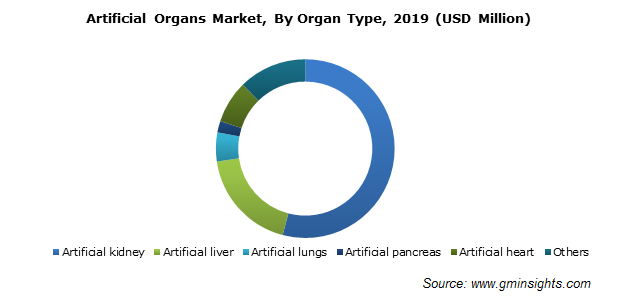Artificial Organs Market size worth over $33.5 Bn by 2026
Published Date: November 2020
Artificial Organs Market size is set to surpass USD 33.5 billion by 2026, according to a new research report by Global Market Insights Inc.
Insufficiency of donor organs for transplantation will create demand for artificial organs in the coming years. There are numerous patients that get added to the waiting list every day that need an organ transplant. With scarcity of donor organs, several people die to the severity of chronic diseases. Rising pervasiveness of diseases such as renal disorders, liver disorders, respiratory disorders among others is growing the demand for organ replacement. Due to increase in mortality rate, the requirement for advanced artificial organs is growing parallelly, that will subsequently assist the market growth.
Advancements in artificial organs will boost the market expansion. Industry players are emphasizing on research activities to bring to market novel artificial organs. For instance, in September 2017, Zimmer Biomet announced global launch of the Persona partial knee system. Similarly, other firms are focusing on acquisitions, collaborations and partnerships to develop new products. Additionally, few universities and research centers are continuously discovering new approaches to create breakthroughs.
Increasing burden of chronic kidney diseases will accelerate the demand for artificial kidneys

Get more details on this report - Request Free Sample PDF
Artificial kidney segment valuation was around USD 10 billion in 2019. Chronic kidney diseases affect about 10% of the global population and kills millions among them. Rising mortality rate of kidney disorders is thus stimulating the demand for artificial kidneys. Development of bioartificial kidneys over the years has facilitated better outcomes and thereby its adoption.
Browse key industry insights spread across 101 pages with 135 market data tables & 11 figures & charts from the report, “Artificial Organs Market Size By Organ Type (Artificial Kidney, Artificial Liver, Artificial Lungs, Artificial Pancreas, Artificial Heart), By Material Type (Silicon, Plastic, Steel), Industry Analysis Report, Regional Outlook, Industry Analysis Report, Application Potential, Competitive Market Share & Forecast, 2020 – 2026” in detail along with the table of contents:
https://www.gminsights.com/industry-analysis/artificial-organs-market
Growing adoption of stainless steel as suitable material for artificial organs
Steel artificial organs segment is projected to observe 9.2% growth rate till 2026. Increasing use of stainless steel for developing artificial organs for patients suffering from cardiovascular and orthopedic disorders will drive the market value. Growing incidence of orthopedic diseases and demand for joint replacement surgeries will thus fuel the usage of steel.
Investment on development of artificial organs in the U.S. will assist in industry expansion
North America artificial organs market accounted for more than 39% of revenue share in 2019. The U.S. has large patient pool suffering from various chronic disorders. Several patients among this population require organ transplant due to organ failure. Thus, high disease burden along with investment by the government and private institutions to develop artificial organs will strengthen the market size. High awareness rates about product availability also positively impacts the market growth. Presence of notable market leaders and distribution of products will further ensure the market expansion in the foreseeable future.
Companies are entering into collaborations to broaden their product offerings
Some of the major players operating in the artificial organs market include Medtronic, Nipro Corporation, Zimmer Biomet, Boston Scientific Corporation and Ekso Bionics among others. Prominent market participants have adopted certain strategic initiatives such as collaborations and product advancements to enhance their growth potential.
Sumant Ugalmugle, Rupali Swain